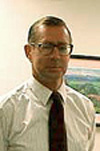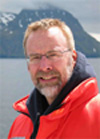 January 29, 2005
Over the past three decades, the Arctic has become steadily warmer. By some accounts, the Arctic has warmed an average of three degrees. That doesn't seem like much, but it's been enough heat to melt an area of Arctic sea ice larger than the state of Texas. Some scientists say it's the strongest evidence yet that humans are heating up the climate. But others say the warming is part of a natural cycle that has played out across the Arctic for thousands of years.
John Walsh is a climate scientist and the director of the Center for Global Change and Arctic System Research at the University of Alaska Fairbanks. Walsh said, "For example, in this most recent century the Arctic warmed rapidly from about 1900 to 1940. Then it cooled from about 1940 to 1970, and then it warmed from 1970 to 2000 at a pretty good rate. Now we don't know if the present warming is going to continue for another 10 or 20 years, and then there will be a downtick. We don't know if a downtick will set in fairly soon. It could go either way." Many scientists say the current warming trend is the direct result of a global obsession for coal, gas, and oil. The burning of these fossil fuels releases carbon dioxide and other gases into the atmosphere that slow the escape of heat from the earth, dramatically altering the planet's climate and weather. Nowhere has the impact been felt more dramatically than in the Arctic. According to the Arctic Climate Impact Assessment, an international study of the Arctic's climate that Walsh helped to author, a warmer climate has resulted in the reduction of sea ice, the melting of glaciers, the expansion of trees and shrubs into the tundra, and the thawing of frozen ground called permafrost. But humans aren't the only cause of Arctic climate change. Mark Johnson is an oceanographer at the University of Alaska Fairbanks School of Fisheries and Ocean Sciences. He's studied the Arctic for more than 20 years, and he's among a cadre of leading scientists who say the Arctic is warming, but that natural cycles are the major reason why.
Johnson said, "Not all my colleagues would share that, but people who are really in the know say that the variability we are seeing now and in the last 20 years, 30 years, is 70 percent natural variability." Some of these natural events include volcanic eruptions. Dust and soot from volcanoes block incoming solar radiation and can have a cooling effect on climate. But even more important are the natural climate cycles driven by interactions between the ocean and the atmosphere. Such cycles can last decades. Johnson believes the warming of the Arctic over the past 30 years has been largely the work of such natural ocean-atmosphere cycles. What's more, he predicts the Arctic climate will become somewhat cooler over the next decade. It's a trend he says will lead to more sea ice in the Arctic Ocean than has been seen in recent years. Johnson said, "I personally think we are part of a cycle here. While there is a long-term trend of sea ice decline, I think there is going to be more ice. By 2010, I think we are going to be back into colder conditions." Still, looking 50 to 100 years into the future, Mark Johnson and John Walsh agree that the Arctic climate will become steadily warmer overall. But along the way they say there will be short-term cold spells. Walsh likens the Arctic's climate fluctuation to the ups and downs of the stock market. "One of the best analogies I've heard is with the stock market. If you are in a bull market in stocks, and the trend is upward, but in any week or month it could be either up or down. So you have a lot of those shorter term ups and downs are superimposed on a longer term trend," said Walsh.
Story courtesy Arctic Science Journeys. ASJ is a radio service highlighting science, culture, and the environment of the circumpolar north. Produced by the Alaska Sea Grant College Program and the University of Alaska Fairbanks.
|
||||

